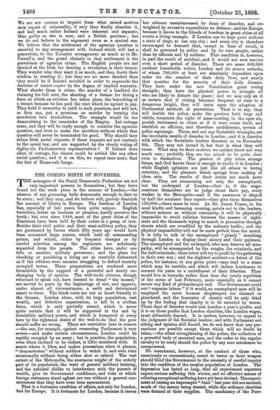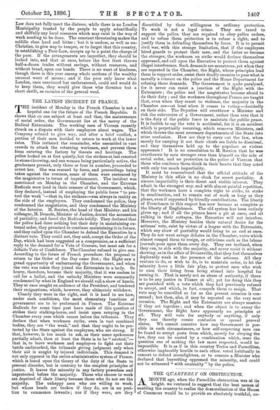THE COMING NINTH OP NOVEMBER.
THE managers of the Social Democratic Federation are not very important persons in themselves ; but they have found out the weak place in the armour of London,—the absence of any governing body democratic enough to dare to be stern ; and they may, and we believe will, gravely diminish the amount of liberty in Europe. The freedom of London has, especially of late years, been quite unique. English travellers, intent on business or pleasure, hardly perceive the truth ; but ever since 1848, most of the great cities of the Continent have been held by their rulers in a grasp of iron. Besides their civil police and their semi-military police, they are garrisoned by forces which fifty years ago would have been accounted large armies, which hold all commanding points, and which, either by frequent changes or by careful selection among the regiments, are sedulously separated from the people. The cities have, under one title or another, military governors ; and the plans for checking or punishing a rising are as carefully elaborated as if the citizens were enemies struggling to defend recently occupied towns. These preparations are rendered more formidable by the support of a powerful and nearly un- changing body of opinion. The well-to-do citizens, though reluctant to speak out, have learned to dread " the masses," are moved to panic by the beginnings of riot, and approve, under almost all circumstances, a swift and determined resort to force. The black coats are not at heart friendly to the blouses. London alone, with its huge population, vast wealth, and defective organisation, is left to a civilian force, which is only partially armed, which is never quite certain that it will be supported in the end by irresistible military power, and which is hampered at every turn by the righteous desire of the well-to-do that the poor should suffer no wrong. There are restrictive laws in reserve —the one, for example, against overawing Parliament is very -severe—and under certain circumstances, London could be rapidly occupied by an army ; but in practice, the population, -even when inclined to be violent, is little interfered with. It meets where it likes, and makes processions when it pleases, " demonstrates" without soldiers to watch it, and even riots 'occasionally without being either shot or sabred. The vast extent of the Metropolis, the enormous weight of the orderly part of its population, the want of general military training, and the national dislike to interference with the pursuit of wealth, give its Government confidence, and risks at which foreign statesmen stand aghast are run without a general con- sciousness that they have even been encountered.
That is a fortunate condition of affairs, not only for London, but for Europe. It is fortunate for London, because it leaves her citizens unembarrassed by fears of disorder, and un- weighted by excessive expenditure on defence ; and for Europe, because it leaves to the friends of freedom in great cities at all events a living example. If London can be kept quiet without a state of siege, so can any city ; and every city is therefore encouraged to demand that, except in time of revolt, it shall be governed by police and by its own people, rather than by officials and by soldiers. This condition is, however, in part the result of accident, and it would not now survive even a short period of disorder. There are some 800,000 resident households within London and its nearer suburbs, of whom 700,000 at least are absolutely dependent upon order for the comfort of their daily lives, and nearly that number for the security of their daily dinners. They have under the new Constitution great voting strength; they have the physical power to strangle all who are likely to disturb the peace ; and we may rely on it as certain that if rioting becomes frequent, or rises to a dangerous height, they will insist upon the adoption of Continental methods of prevention. That is to say, they will double the police, make the garrison both large and visible, terminate the right of mass-meeting in the open air, punish incitement to crime as if it were crime itself, and establish an efficient, and therefore meddlesome, system of police espionage. Those, and not any Socialistic triumphs, are the inevitable results of disorder in London ; and it is disorder with which the Socialistic leaders threaten us on November 9th. They may not intend it, but that is what they will cause. What may be their motives we neither know nor very much care ; probably they are too mixed to be quite clear even to themselves. The passion of pity takes strange forms, and God knows there is enough to excite it in London ; while English agitators are just like all others in loving notoriety, and the pleasure which springs from making of ideas acts. The results of their action are much more clear. They are summoning not only the unemployed, but the underpaid of London—that is, if the wage- receivers themselves are to judge about their pay, every worker in the Metropolis—and if the summons is obeyed by half the numbers they expect—they give them themselves 120,000—there must be riots. As Sir James Fraser, in his most kindly and becoming warning, points out to the leaders, without menace as without contumely, it will be physically impossible to avoid collision between the masses of sight- seers and the thousands trying to march in procession through streets which are overfilled by the ordinary traffic; and the physical impossibility will not be more perfect than the moral. It is folly to talk of the unemployed " grimly " marching through London to display their misery and their patience. The unemployed and the underpaid, who may deserve all sym- pathy, will be accompanied by the roughs, the criminals, and the half-criminals; these latter will try to profit by the gathering in their own way ; and the slightest accident—a defeat of the police, for instance, at any given point—may lead to a scene which may be terrible, and which will induce Londoners to consent for years to a curtailment of their liberties. They would live in barracks rather than bear the yearly repetition of the scene of last February, more especially as it cannot secure any kind of philanthropic end. The Government could not " organise labour " if it would, no unemployed man will be employed the more because shopkeepers are alarmed or plundered, and the fountains of charity will be only dried up by the feeling that charity is to be extorted by terror. Three days of disorder would cost London a year's profits, and it is on those profits that London charities, like London wages, must ultimately depend. It is useless, however, to appeal to the judgment of the Socialist leaders ; and with Parliament not sitting and opinion still flaccid, we do not know that any pre- cautions are possible except those which will no doubt be taken,—the silent strengthening of the police, the collection of a powerful body of mounted men, and the order to the regular cavalry to be ready should the police by any sore mischance be overpowered.
No resentment, however, at the conduct of those who, consciously or unconsciously, resort to terror as their weapon should blind the Government to the necessity of careful inquiry into the condition of the surplus population of London. The depression has lasted so long, that all experienced reporters expect serious suffering this winter, and no effective means of relieving exceptional suffering have yet been devised. Theexperi- -ment of raising an impromptu " fund " last year did not succeed, much of the money being wasted, while the ordinary charities were drained of their supplies. The machinery of the Poor- Law does not fully meet the distress, while there is no London Municipality trusted by the people to apply scientifically and skilfully any local resources which may exist in the way of work needing to be done. The constant threatening makes the middle class hard and bitter ; but it is useless, as well as un- Christian, to give way to temper, or to forget that this country, in establishing a Poor-Law, accepts up to a point the charge of the poor. If the arrangements are imperfect, they should be looked into, and that at once, before the first frost throws half-a-dozen trades without savings, without resources, and without bread, upon our hands. There is no want of kindness, though there is this year among whole sections of the wealthy unusual want of means ; and if the poor only knew what London, once convinced but unthreatened, could and would do to keep them, they would give those who threaten but a short shrift, as enemies of the general weaL



































 Previous page
Previous page